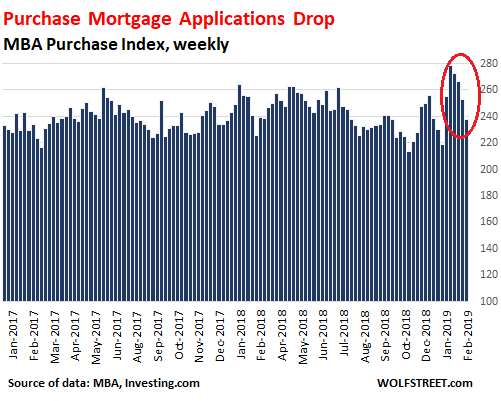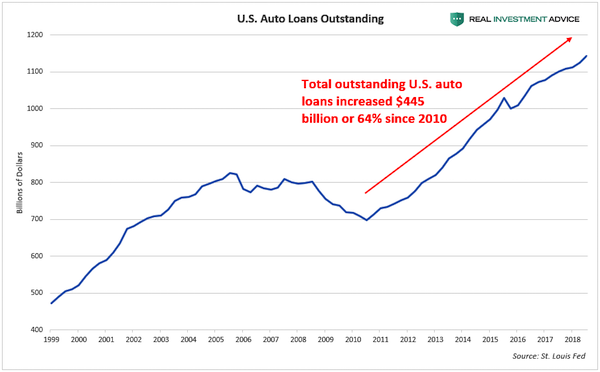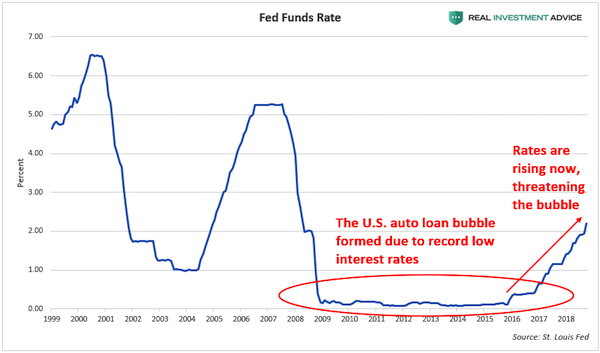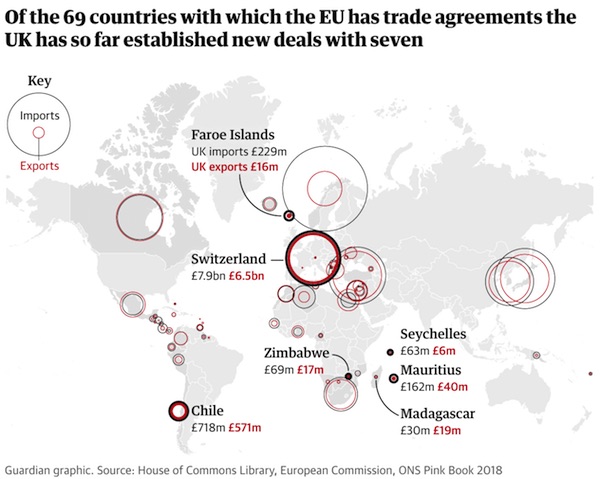
Juan Gris Portrait of Pablo Picasso 1912

Wolf Richter has the entire top-11. I picked a few. Note: this is debt-to-GDP. For debt-to-disposable income, graphs are different. Note 2: Switzerland is always an odd one out because of the role of its banking system.
• World’s Biggest Debt Slaves: Americans Wimp Out in 11th Place (WS)
US household debt inched down to 76.4% of GDP in the third quarter 2018, according to the newest batch of global data from the Bank for International Settlements. This was the lowest level since 2002. It put Americans in the inexplicably wimpy, and for the finance sector, insufferable 11th place:
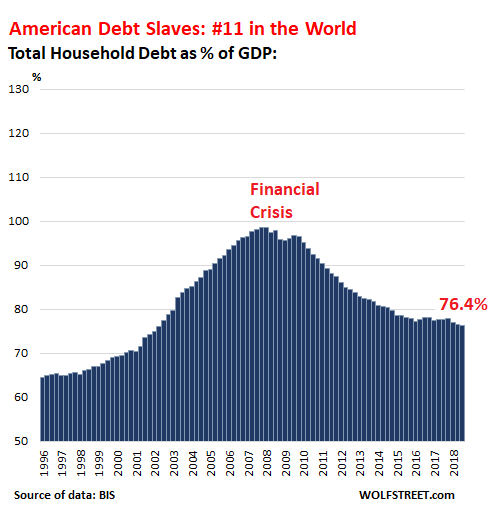
Canadian households have long been making headlines with their top-notch borrowing binge to support their top-notch housing bubble. By other debt measures, such as debt-to-disposable income, Canadian and Australian households have been battling over first place for years. In the debt-to-GDP measure, Canadian households are in a still respectable 6th place: This debt will pose some issues as the majestic housing bubbles in top metros are now deflating:
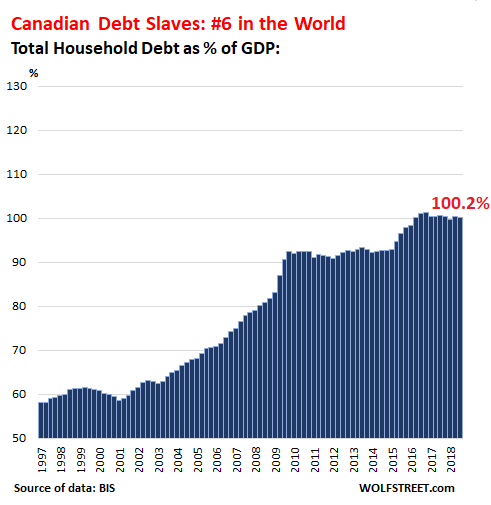
Households in the Netherlands were track to be undisputed king of the hill, with a debt-to-GDP ratio nearing 120%, in part because GDP plunged during the Financial Crisis, which caused the spike in the debt-to-GDP ratio and the collapse of some banks. During the subsequent euro debt crisis, GDP declined again. But since then, the economy has grown, and households have curtailed their borrowing, edging away from the brink, and in the process getting demoted to 4th place:
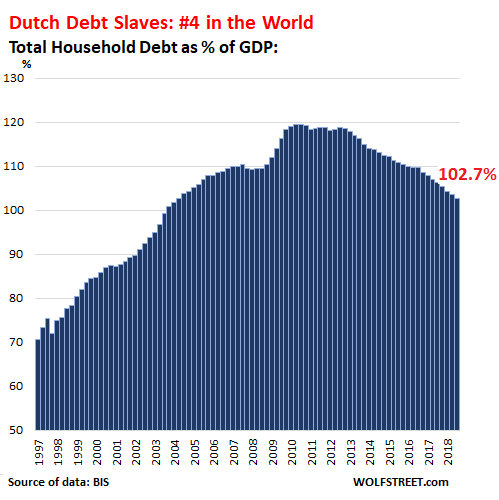
Australian households have been caught up in one of the biggest housing bubbles in the world, financed by debt. The household-debt-to-GDP ratio more than doubled between 1997 and 2016. Now that the housing bubble is deflating at an astounding pace, the debt ratio has begun to tick down, but remains in second place:
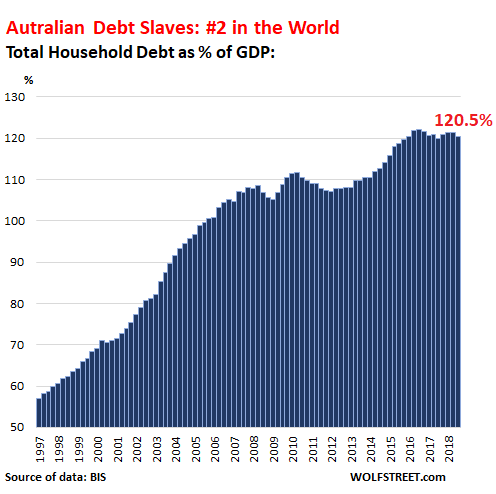
[..] the #1 debt slaves in the world: Swiss households. This is one of the reasons interest-rate repression remains the rule in Switzerland. The Swiss National Bank has imposed its negative interest rate policy on the country for years, and there have been stories of mortgages with 0% and even negative interest rates. There is simply too much household debt, and no one wants to see it blow up. Hence the negative interest rate policy. But this policy encourages more household borrowing, and the cycle will continue until it can’t:
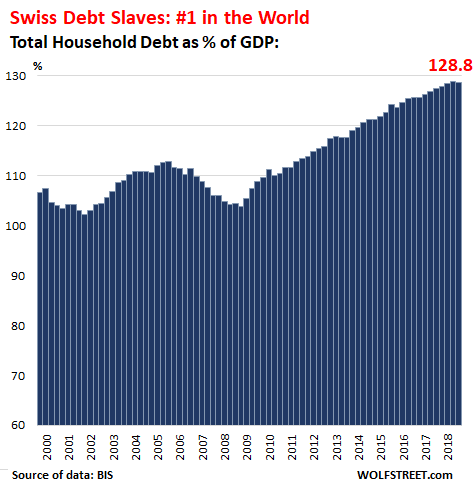
China is in a category of its own. And so the chart has a different scale. The household-debt-to-GDP ratio is still in the German neighborhood of just above 50%, but it has quintupled in the 12 years since the BIS data began in 2006. The idea that Chinese households are paying cash to sustain their housing bubble or to buy cars has become a bad joke: Chinese consumers have discovered debt, and they are eagerly turning into debt slaves:
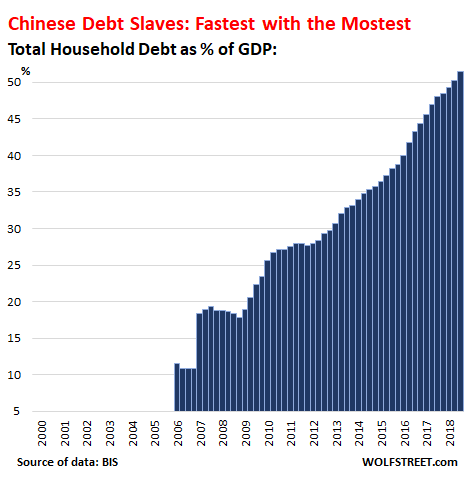

Daniel Ellsberg: “Chelsea Manning is again acting heroically in the name of press freedom, and it’s a travesty that she has been sent back to jail for refusing to testify to a grand jury. An investigation into WikiLeaks for publishing is a grave threat to all journalists’ rights, and Chelsea is doing us all a service for fighting it. She has already been tortured, spent years in jail, and has suffered more than enough. She should be released immediately.”
• Chelsea Manning Jailed For Refusing To Testify About Wikileaks (ZH)
Following a dramatic hearing at a federal district court in Eastern Virginia, activist and former military prisoner Chelsea Manning was jailed by a judge for contempt of court after refusing to testify to a grand jury empaneled in the government’s long running criminal investigation into Wikileaks and its founder, Julian Assange. The judge, the Hon. Claude H. Hilton, ruled that Manning must remain in civil detention until she testifies, her lawyer Moira Meltzer-Cohen told the New York Times. Manning was subpoeaned in January to testify before the jury. But she vowed not to cooperate even though prosecutors offered immunity for her testimony. “In solidarity with many activists facing the odds, I will stand by my principles,” she said on Thursday. “I will exhaust every legal remedy available. My legal team continues to challenge the secrecy of these proceedings, and I am prepared to face the consequences of my refusal.”
Manning’s jailing offers another glimpse into the government’s secretive investigation into Wikileaks, which was started under the Obama Administration and picked up by the Trump Administration. Manning served seven years in prison for leaking the infamous “collateral murder” tape to Wikileaks, by far the longest prison term ever served for leaking government secrets. Manning, who transitioned to a woman during her time in prison, twice tried to commit suicide before she was pardoned by Obama. Late last year, an accidental leak of some information in the case revealed that Assange had been charged under seal last summer. And while Manning has decided to refuse to cooperate, a Wikileaks volunteer recently agreed to testify against Assange in exchange for immunity. The grand jury has been investigating Assange for nine years.
** Chelsea was taken into custody today for resisting a grand jury in the Eastern District of Virginia
Chelsea provided the following statement: pic.twitter.com/tWjEOFyhYn
— Chelsea E. Manning (@xychelsea) March 8, 2019
Chelsea Manning jailed for refusing to testify on WikiLeaks and Assange. Whistleblowers are now being forced to testify against journalists and sent to jail when they don´t cooperate. A new angle in the attack on media freedom. https://t.co/EylPI5vCEB
— WikiLeaks (@wikileaks) March 8, 2019

This is the worst condemnation of US media to date. And I betcha, no-one sees it that way. Whatever Mueller says, minds are made up. By what then? Can only be unproven accusations.
And it has similarities with the Chelsea Manning disaster: When will the first Republican refuse to testify before Nadler’s committee? In both cases people are looking to confirm pre-established narratives, if need be by force.
• On Trump’s Ties To Russia, Americans Have Made Up Their Minds – Poll (R.)
Only a small number of Americans have not yet made up their minds about whether Donald Trump’s 2016 election campaign coordinated with Russian officials, according to new Reuters/Ipsos polling, which also showed deep divisions in the United States in the run-up to the 2020 presidential election. Eight out of 10 Americans decided almost immediately about Trump campaign ties to Moscow and only about two in 10 appear to be undecided, the opinion poll released on Friday showed. About half of Americans believe President Trump tried to stop federal investigations into his campaign, the survey found. Special Counsel Robert Mueller is expected to soon wrap up his investigation into U.S. allegations that Moscow interfered in the U.S. political process as well as the Trump campaign links and possible obstruction of justice.
Moscow and Trump deny the allegations. Barring bombshell revelations, the survey results suggest the investigation’s influence on voters in the 2020 campaign may already have run its course. The Reuters/Ipsos poll has tracked public opinion of the investigation since Mueller was appointed in May 2017 following Trump’s firing of FBI chief James Comey, gathering responses from more than 72,000 adults. Public opinion appears to have hardened early, changing little over the past two years despite a string of highly publicized criminal charges against people associated with the Trump campaign. Every time respondents were asked about the investigation, about 8 in 10 Democrats said they thought the Trump campaign colluded with Russia, while 7 in 10 Republicans said they did not.
With so few voters left undecided, the report expected from Mueller looks unlikely to serve as a significant voter turnout tool for Republicans or Democrats in November 2020 and could backfire on Democrats if they overplay it. “We keep waiting for something to happen during the Trump era to vastly change the way people view him,” said Kyle Kondik, a non-partisan analyst at the University of Virginia Center for Politics. “It hasn’t happened yet,” he said. “Maybe at this point there just aren’t many minds left to change.”

The media can’t let go of Russiagate, no matter what Mueller says, it would leave them empty handed. So they play into the fact that Americans have their minds made up anyway. Scary when you think about it.
• Trump’s Private Talks With Putin May Contain Clues To His Russia Romance (G.)
Since Donald Trump was sworn in as president he has met his Russian counterpart, Vladimir Putin, five times. The details of their conversations remain unknown to the public, and in most cases even to senior administration officials. Democrats in Congress are now demanding more details of communications between the two leaders. Secrecy around such meetings, they say, raises fresh questions about the nature of Trump’s relationship with Putin at a time when his ties to Russia are the subject of several investigations. The meetings with Putin are not the only subject of such Democratic demands. House leaders left little room for doubt this week that they will utilize their newly minted majority to cast a wide net around the president, his family and their businesses.
The judiciary committee issued document requests to 81 individuals and entities, seeking information on everything from contacts between Trump aides and Moscow to hush money payments to women and possible obstruction of justice. [..] Democrats now say Trump’s reportedly forceful attempts to conceal his communications with Putin raise questions about his motivations in pursuing closer relations with a regime largely regarded as a primary adversary. In a joint letter this week, the chairs of the House intelligence, foreign affairs and oversight committees raised “profound national security, counterintelligence and foreign policy concerns, especially in light of Russia’s ongoing active measures campaign to improperly influence American elections.

Discussions America should have but refuses. The Dem old guard wants things to stay as they were/are. But the party must change in radical ways.
• Ilhan Omar Criticizes Obama And Past Presidents’ ‘Really Bad Policies’ (MW)
Rep. Ilhan Omar (D-Minn.) says former President Barack Obama’s promise of “hope and change” was just a mirage in a Politico interview that hit on Friday. The magazine profile explains that when she ran for office in 2016, she was fed up with the Democratic Party — not so much Trumpism or politics in general. Omar also reminded the interviewer that there was “caging of kids” at the U.S.-Mexico border under the Obama administration. (Obama was called the “deporter-in-chief” by immigrant rights advocates for the record number of undocumented immigrants deported during his presidency; ICE deportations peaked at 409,849 in 2012. But it dropped to almost half of that by 2017.) mAnd she called out the “droning of countries around the world” under Obama. A 2015 report claimed that nearly 90% of people killed in recent drone strikes in the Middle East “were not the intended targets.”
The interview dropped the day after the House passed a resolution condemning bigotry that included anti-Semitism and anti-Muslim discrimination, which was a response to comments made by Omar, who accused people of having allegiances to foreign countries. (It did not mention Omar by name, however.) Her comments to Politico suggest she doesn’t mind being at the center of controversy. “As much as other people are uncomfortable, I’m excited about the change in tone that has taken place that is extremely positive … and my ability, I think, to agitate our foreign policy discussions in a way that many of my colleagues who have been anti-intervention, antiwar have been unable to do in the past,” she said. “So, I’m OK with taking the blows if it means it will ignite conversations that no one was willing to have before.”
Ilhan Omar on Barack Obama. Wow:https://t.co/qzeccRujOs pic.twitter.com/dQuXleRwMS
— Blake News (@blakehounshell) March 8, 2019

Is the Guardian finally standing up for May? Bit late, isn’t it?
• EU’s Barnier Sets May On Course For Brexit Defeat (G.)
Theresa May appears set for a second humiliating defeat when she brings her Brexit deal back to parliament next week, after the EU’s chief negotiator, Michel Barnier, rebuffed her pleas for last-minute concessions. The prime minister urged MPs to “get it done” and back her deal, in an impassioned speech at a dockside warehouse in the leave-voting town of Grimsby. A vote against the deal would mean “not completing Brexit and getting on with all the other important issues people care about, just yet more months and years arguing”, May told MPs. “If we go down that road we might never leave the EU at all.”
Addressing workers from Ørsted, a Danish energy and wind turbine firm, May also urged the EU to make new concessions over the Irish backstop – the issue that caused many of her MPs to vote against the deal the first time – before last-ditch talks in Brussels this weekend. The EU “has to make a choice too”, the prime minister said. “We are both participants in this process. It is in the European interest for the UK to leave with a deal. We are working with them but the decisions that the European Union makes over the next few days will have a big impact on the outcome of the vote. “European leaders tell me they worry that time is running out and that we only have one chance to get it right. My message to them is: now is the moment for us to act.”
But Barnier immediately appeared to rebuff the prime minister, by responding with an offer of reverting to his original plan, the Northern Ireland-only backstop, which May repeatedly said no prime minister could accept, because it risked creating a border in the Irish Sea. The EU’s chief negotiator said in a series of tweets that the EU was committed “to give the UK the option to exit the single customs territory unilaterally, while the other elements of the backstop must be maintained to avoid a hard border. [The] UK will not be forced into a customs union against its will.” The Brexit secretary, Stephen Barclay, immediately replied: “With a very real deadline looming, now is not the time to rerun old arguments. The UK has put forward clear new proposals. We now need to agree a balanced solution that can work for both sides.”

If a tree falls in a forest….
• Corbyn Tells May Second Defeat For Her Deal Is ‘The End Of The Road’ (Ind.)
Jeremy Corbyn has warned Theresa May not to make a third attempt to ram through her Brexit deal if it crashes to its expected defeat next week, saying it must be “the end of the road”. The prime minister has not ruled out a third “meaningful vote” if MPs reject her agreement next week – even with the scheduled exit day from the EU just three weeks away. But, speaking to Labour activists in Scotland, Mr Corbyn said Ms May must accept that defeat on Tuesday would “represent an unprecedented failure in British political history”. “Having already failed once to get her deal through, I want to make it clear to the prime minister if she fails again it will be the end of the road for her deal,” the Labour leader said.
“There is no coming back from it. There can be no more playing for time.” Mr Corbyn again insisted Labour’s softer Brexit proposals could secure agreement both at Westminster and in Brussels, following his “discussions with Michel Barnier” [the EU negotiator]. However, he also insisted Labour was not “obsessed” by Brexit like other parties – pointing to poverty and climate change as the issues that really matter. “Turn on the news at the moment and you’ll hear endlessly about constitutional issues. Brexit. Independence. It borders on the obsessive,” he told a conference in Dundee. “You don’t hear so much about the children arriving hungry to school or how the teachers at one nursery have had to arrange for Tesco and Greggs to donate their leftovers so they can feed the kids.”

I think Moore has at least a partial burden of proof here. Just shouting out stuff isn’t good enough at this stage. Suggesting that research is good only if it’s paid by General Electric or Dupont or 3M is quite the stretch. Even if politics and business are indeed eyeing huge profits off of going green and off people’s ignorance about what that means.
• Greenpeace Co-Founder Thrashes Global Warming ‘Brainwashing’ Campaign (RT)
Greenpeace co-founder Patrick Moore had harsh words for the modern environmental movement, calling global warming “the greatest scam in history” and denouncing the use of “fear and guilt” to push the message. “The climate catastrophe is strictly a fear campaign – well, fear and guilt,” Moore told Breitbart radio host Rebecca Mansour. “You’re afraid you’re killing your children because you’re driving them in your SUV and emitting carbon dioxide into the atmosphere and you feel guilty for doing that. There’s no stronger motivation than those two.” “This abomination that is occurring today in the climate issue is the biggest threat to the enlightenment that has occurred since Galileo.”
“Nothing else comes close,” Moore insisted, likening the contemporary environmental movement to “a toxic mix of ideology, of politics and religion.” “CO2 is the food for life! It’s not pollution,” the would-be heretic declared, claiming that the use of fossil fuels had actually “saved life from an early demise” because CO2 had been declining since the last ice age, with barely enough for the earth’s plant life to sustain itself, until humanity stepped into the breach during the Industrial Revolution. Moore, who founded the pioneering environmental activist group almost 50 years ago to protest nuclear war, met with an outpouring of support from conservatives and weary Democrats alike, after tweeting a scathing rebuke earlier this week to Alexandria Ocasio-Cortez, whose quixotic Green New Deal has become the standard-bearer of the 21st century environmental movement.
“And so you’ve got the green movement creating stories that instill fear in the public. You’ve got the media echo chamber — fake news — repeating it over and over and over again to everybody that they’re killing their children, and then you’ve got the green politicians who are buying scientists with government money to produce fear for them in the form of scientific-looking materials, and then you’ve got the green businesses, the rent-seekers and the crony capitalists who are taking advantage of massive subsidies, huge tax write-offs, and government mandates requiring their technologies to make a fortune on this, and then of course you’ve got the scientists who are willingly, they’re basically hooked on government grants.
When they talk about the 99 percent consensus [among scientists] on climate change, that’s a completely ridiculous and false numbers, but most of the scientists — put it in quotes, scientists — who are pushing this catastrophic theory are getting paid by public money. They are not being paid by General Electric or Dupont or 3M to do this research, where private companies expect to get something useful from their research that might produce a better product and make them a profit in the end because people want it — build a better mousetrap type of idea — but most of what these so-called scientists are doing is simply producing more fear so that politicians can use it control people’s mind and get their votes because some of the people are convinced, ‘Oh, this politician can save my kid from certain doom.’

The collapse may happen soon, but likely not because of an old topic like this.
• Italy’s Government On Verge Of Collapse Over A Train (ZH)
With the Italian government seemingly on the verge of collapse every few months, and with tensions between the two parties in the ruling coalition – Five Star and the League, especially as the former has been sliding in the polls at the expense of the latter’s rising popularity – escalating in recent weeks, it was only a matter of time before Italian bondholders had a PTSD flashback to May 2018 when the populist government first stormed on the stage, sending Italian bonds plunging. All that was missing was a catalyst. Said catalyst emerged as a lingering dispute within Italy’s ruling coalition over the future of a train, or technically a high-speed rail link with France, escalated suddenly on Thursday, once again raising the risk of a government collapse, with the 5-Star chief accusing his partner of acting irresponsibly.
The Alpine rail line has been backed by the ruling League party but is fiercely opposed by its coalition partner, the 5-Star Movement, which argues Italy’s share of the funding would be better spent upgrading existing roads and bridges. And after League leader, the outspoken Matteo Salvini who continues to enjoy rising popularity with every new poll, said in an evening television interview he would not back down and his party would “never sign” a decree to block the project, 5-Star chief Luigi Di Maio accused him of threatening to bring down the government.
While the tensions between Di Maio and Salvini were for the most part contained before closed doors, the animosity between the two “equal” vice premiers erupted in public when Di Maio said in a statement that Salvini “will bear the responsibility before millions of Italians” adding that he considers “this to be irresponsible behavior” adding that he was “stunned by the threat of a government crisis” coming from Salvini. The TAV project (Treno Alta Velocita) is a joint venture between the Italian and French states to link the cities of Turin and Lyon with a 58-km (36-mile) tunnel through the Alps on which work has already begun. According to Reuters, the EU has pledged to fund up to 40 percent of costs, Italy up to 35 percent and France up to 25 percent.
Earlier on Thursday, Italy’s Prime Minister Giuseppe Conte said that recently updated traffic projections for the line warranted a review of the project’s long-term viability and, if necessary, a renegotiation of the way the funding is split. Conte told reporters he had strong personal doubts about the validity of the venture and he would take responsibility for a final decision based on a cost-benefit analysis already carried out by the government. That analysis, commissioned by Transport Minister Danilo Toninelli, a 5-Star politician, found the TAV was a waste of public money, estimating the economic return would be a negative balance of $7.9-$8.8 billion. Conte, who is technically not a member of either party but is closer to 5-Star, called the funding of the TAV “iniquitous” and said he would speak to France and the EU “to share our doubts and perplexities.”

Like the part where Big Pharma gets the big subsidies.
• Dutch Pharmacies Join Backlash At Expensive Drugs By Making Their Own (R.)
In a radiation-proof room at the Erasmus Medical Center in Rotterdam, Emar Thomasa sits behind shielded glass as he carefully measures and mixes lutetium octreotate, an intravenous treatment for certain types of cancer. The Dutch hospital has been offering it to patients for more than a decade at 16,000 euros ($18,000) for one course of treatments. Drug firm Novartis, which in 2018 acquired rights to sell it in Europe, is asking more than five times that for its proprietary version, Lutathera. Thomasa is part of a protest against high drug prices launched by an unlikely group of rebels: Dutch pharmacies.
Three – Erasmus, Amsterdam’s University Medical Center (UMC) and the Transvaal Pharmacy in The Hague – have vowed to bypass drug company products and make treatments for a handful of rare diseases themselves, exercising their right to “compound” medicines. The Dutch market is small, with only hundreds of patients for the diseases in question. But the dispute is part of a growing global backlash against high drug prices, from the United States and Canada to Japan, and campaigners said it was being closely watched by health experts elsewhere. “People with rare diseases are dependent on medicines that are so expensive that they can’t afford them, when they could be offered for a much lower price,” said UMC pharmacist Marleen Kemper.
“The pharmaceutical industry plays an important role in developing good products, but we think it’s not fair if these firms make big money off these patients.” Compounding is the ancient practice of preparing medicines for individual patients. Pharmacists are trained to compound, though nowadays most medicines are made by industrial producers. Drug companies have raised concerns about the safety of compounded medicines that have not been approved by European regulators. But the specialized compounding pharmacies, which have on-site laboratories, have been backed by the Dutch government as part of efforts to tame rapidly rising medicine costs.
[..] The first two drugs targeted by Dutch pharmacies are Novartis’s Lutathera and a drug called CDCA, registered in Europe by Leadiant. High prices are not unusual for new rare disease drugs, as companies must recoup development costs from a relatively small group of patients. Novartis charges 92,000 euros for a one-off course of four Lutathera injections. But while the drug is innovative, its development costs were relatively small and cannot justify the price tag, said Erasmus MC Chief Executive Ernst Kuipers. Main development costs amounted to about 40 million euros, including 15 million euros in public funding, according to Erasmus – where most of the testing took place – and a review published in the Dutch Journal of Medicine.

Jim at his best.
• A Place of Your Own (Jim Kunstler)
I don’t think you can overstate the damage we’ve done to ourselves in the sheer material arrangement of our national life. A decade ago, I sat in on many zoning board meetings called to approve new WalMarts and other chain-stores around my region of upstate New York and southern Vermont. Inevitably, the companies organized a claque of locals in the meeting hall — itself a depressing, low-ceilinged chamber of cinder blocks and fluorescent lighting — to fill the seats and yell in support of “bargain shopping.” That was some bargain they got. The chain-stores got approved and the Main Streets died, but that wasn’t the end of it. This dynamic also destroyed networks that gave local citizens an economic and social place.
Locally owned business people were the caretakers of the town. They took care of two buildings — their place of business and their home. They sat on library, school, and hospital boards and donated money to running local institutions. They employed people who lived in town and there were consequences for treating them well or badly. There was even a time in this country when local business people wouldn’t dare to put up an insultingly ugly building. A lot of this economic behavior has produced the social perversities of our time. Exterminating an entire class of local merchants has eliminated the heart of the American middle-class and grotesquely concentrated the nation’s wealth among corporate leviathans who comprise one percent of the population.
It also eliminated the place where young people learned how to do business, preparing themselves to try ventures of their own, and to make a place for themselves in the world. What is your place now? A cubicle in the marketing department of Old Navy? An aisle in the Home Depot? A desk in the Diversity and Inclusion office of some State University, pushing to sort the student population into racial and sexual categories because all other ways of belonging in society are gone? Or do you occupy ten square feet of sidewalk with a tarp and a shopping cart? None of those places are liable to furnish a personal sense that life is worth living.



